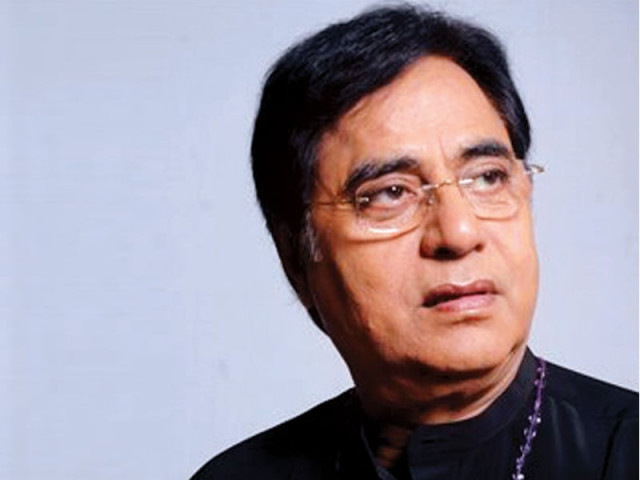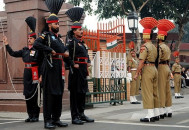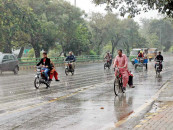Indian music maestro Jagjit Singh dies at 70
Simple Urdu poetry accompanied by mellow compositions and a soothing voice was his ticket to success.

Singh, dubbed "The Ghazal King", had been in intensive care for three weeks after undergoing surgery when he fell seriously ill with a brain haemorrhage.
Ghazals are a poetic form of singing that originated in the Middle East and spread to India from the 12th century.
They were traditionally reserved for the elite, but Singh popularised the form in the 1970s and 1980s by pioneering a modern ghazal sound and using Western instruments alongside Indian classical ones.
"Unfortunately, he expired this morning," said Mohan Rajan, spokesman for the private Lilavati Hospital in Mumbai.
As well as spreading the appeal of ghazal in India, Singh sang and composed for Bollywood, the Hindi-language film industry.
Singh will be best remembered for his music in the films Prem Geet (Love Song) in 1981 and Arth (Meaning) the following year.
He last sang in the low-budget film Khushiyaan (Happiness), which is due in cinemas on Friday.
Jagjit Singh was born to a poor family in the north Indian state of Rajasthan on February 8, 1941.
He took to singing at an early age and like millions of other migrants, travelled to Mumbai, then known as Bombay, to make his fortune.
After initial struggles singing advertising jingles and performing at parties, he found a foothold in regional-language and Bollywood cinema, going on to form a successful duo with his wife Chitra in the 1970s and 80s.
When Singh was taken to hospital on September 23, he had been about to sing at a concert in Mumbai with Pakistani ghazal legend Ghulam Ali.
Updated from Print edition (below)
In memoriam: Ghazal maestro Jagjit Singh is no more
Mirza Ghalib once said about a performer of his time: “My plight becomes a song when it reaches their abode”. This couldn’t be truer for Jagjit Singh – a man who made many contemporary and classic poets a part of pop culture through his soulful voice.
The 70-year-old Indian Ghazal maestro passed away on Monday in the Lilavati hospital Mumbai after being diagnosed with brain hemorrhage two weeks ago.
Ghazal music in the subcontinent has always been governed by Pakistani ghazal singers, such as Mehdi Hassan and Ghulam Ali to name a few, but if there was one Indian who created a global following and came close, if not parallel, to his Pakistani counterparts, it was Jagjit Singh.
Singh was born in 1941 in Sriganganagar, Rajasthan. He admitted in many interviews that he ventured into Ghazal singing to follow the footsteps of his idol, Mehdi Hassan.
Singh brought Ghazal to the masses – simple Urdu poetry accompanied by mellow compositions and a soothing voice was his ticket to success.
Ghazals like “Honton Sae Chu lo tum”, “Tum ko dekha to yeh Khayal aaya” and “Yeh Daulat Bhi Laelo” were a welcome change for the public as Ghazals sung in Pakistan were difficult to understand with the amount of Persian influence in the poetry.
“Jagjit Singh was a brilliant Ghazal singer and an even better human being,” said renowned Pakistani Ghazal singer Salamat Ali Khan. “His avant-garde approach despite being a Ghazal singer is what makes him an evergreen icon.”
In late 1960s, the Ghazal King married Chitra, also a singer, after which the couple produced many super-hit ghazals.
Among the many benchmarks was the unforgettable “Mirza Ghalib” TV series in which Singh provided the vocals to Ghalib’s ghazals.
In 1990, Singh and Chitra lost their only son Vivek in a car accident after which he cut down on the amount of albums he was producing.
“Jagjit Singh rose to fame at a time when he was faced with many competitors like Amanat Ali Khan and Mehdi Hassan but he still managed to make his own mark,” singer Shafqat Amanat Ali told The Express Tribune.
Timeless songs like “Jhuki Jhuki Si Nazar”, “Hosh Walon Ko Khabar Kia” and “Chithi Na Koi Sandes” made him popular in Bollywood. Yet, some still believe that he was under-utilised.
“It is sad that Bollywood couldn’t properly make use of his musical genius but at the same time his individual success is a testimony of his mass appeal,” Indian director Mahesh Bhatt told a local Pakistani news channel.
In 2003, Singh received the Padma Bhushan in 2003 – India’s third highest civilian honor. Jagjit Singh might have passed away but his memories still survive through the much played audio cassettes still lying in our cars.
Published in The Express Tribune, October 11th, 2011.



















COMMENTS
Comments are moderated and generally will be posted if they are on-topic and not abusive.
For more information, please see our Comments FAQ